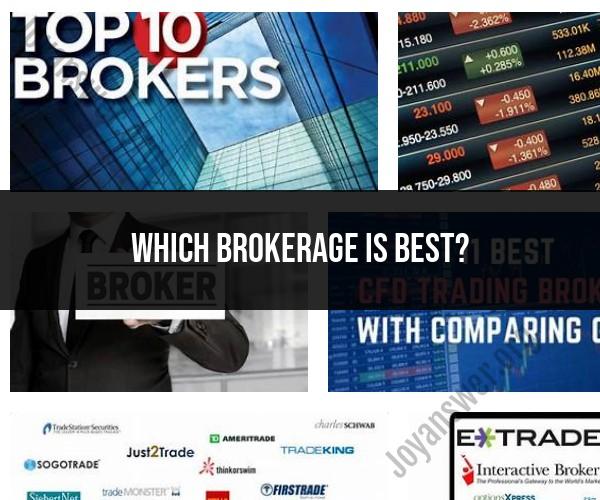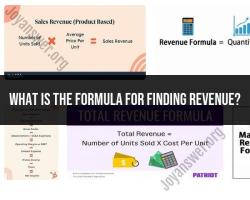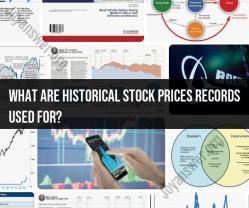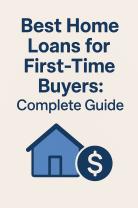Which brokerage is best?
The "best" brokerage for you depends on your specific financial goals, preferences, and individual circumstances. What works well for one person may not be the best choice for another. To determine the best brokerage for your needs, consider the following factors:
Investment Goals:
- Define your investment objectives. Are you looking to build wealth over the long term, save for retirement, trade actively, or achieve other financial goals? Your goals will influence the type of brokerage you need.
Account Types:
- Different brokerages offer various types of accounts, such as individual brokerage accounts, retirement accounts (e.g., IRA or 401(k)), education savings accounts, and more. Choose a brokerage that provides the account types you require.
Investment Products:
- Consider the range of investment products available, including stocks, bonds, mutual funds, exchange-traded funds (ETFs), options, and more. Ensure that the brokerage offers the assets you want to invest in.
Fees and Commissions:
- Evaluate the brokerage's fee structure, including trading commissions, account maintenance fees, and any other charges. Look for low-cost or commission-free options if you're cost-conscious.
Platform and Tools:
- Assess the broker's trading platform and tools. A user-friendly platform with research tools, real-time data, and educational resources can be valuable, especially for beginners.
Customer Support:
- Consider the quality and availability of customer support. Look for brokerages that offer responsive customer service through various channels, such as phone, email, and live chat.
Security:
- Ensure that the brokerage has robust security measures in place to protect your personal and financial information. Look for brokers regulated by reputable authorities.
Account Minimums:
- Some brokerages require a minimum deposit to open an account. Check whether the minimum deposit aligns with your budget.
Mobile Accessibility:
- If you prefer to trade or manage your investments on the go, choose a brokerage with a user-friendly mobile app or website that's compatible with your devices.
Research and Education:
- Access to research reports, market analysis, and educational resources can be invaluable, especially for beginners. Look for brokerages that provide these resources.
Trading Options:
- If you plan to engage in specific types of trading, such as options or futures, ensure that the brokerage offers these products and has the necessary tools and expertise.
Account Features:
- Consider additional features like margin trading, automatic investing, robo-advisory services, and dividend reinvestment plans (DRIPs), depending on your needs.
Trading Experience:
- Some brokerages cater to beginners, while others target experienced traders. Choose one that aligns with your level of experience and trading style.
Regulatory Compliance:
- Verify that the brokerage is regulated by a reputable financial authority, which can provide you with protection in case of disputes.
Reviews and Reputation:
- Read reviews and seek recommendations from peers or financial experts to gauge a brokerage's reputation and track record.
Account Transfer Process:
- If you already have investments with another brokerage, check how easy it is to transfer your accounts to the new brokerage.
Cost of Borrowing (Margin Rates):
- If you plan to use margin (borrowing money to invest), compare the margin interest rates offered by different brokers.
Remember that your choice of brokerage can impact your investment experience, so take the time to research and compare different options. Additionally, consider your personal preferences, such as whether you prefer a traditional brokerage with a physical presence or an online-only brokerage. Ultimately, the "best" brokerage is one that aligns with your financial goals, offers the services you need, and provides a comfortable and secure trading environment.
Comparing Online Brokerages for Trading Fees and Features
There are many different online brokerages to choose from, so it's important to compare their fees and features before you open an account. Some key factors to consider include:
- Trading fees: How much does the brokerage charge per trade? Some brokerages have commission-free trading, while others charge a commission per trade.
- Account fees: Does the brokerage charge any monthly or annual fees? Some brokerages have no account fees, while others charge a fee based on your account balance or activity level.
- Margin rates: If you plan on trading on margin, be sure to compare the margin rates charged by different brokerages.
- Investment options: What types of investments does the brokerage offer? Some brokerages only offer stocks and ETFs, while others offer a wider range of investments, such as options, futures, and mutual funds.
- Trading platform: What kind of trading platform does the brokerage offer? Some brokerages offer basic web-based trading platforms, while others offer more sophisticated desktop and mobile trading platforms.
Best Options Trading Platforms for Active Investors
If you're an active options trader, you'll need a trading platform that offers advanced features and tools. Some of the best options trading platforms for active investors include:
- Interactive Brokers: Interactive Brokers offers a wide range of tools and features for options traders, including a powerful trading platform, advanced charting tools, and real-time market data.
- TD Ameritrade Thinkorswim: Thinkorswim is a popular trading platform for options traders, offering a wide range of charting tools, technical indicators, and paper trading capabilities.
- Tastytrade: Tastytrade is a brokerage and trading platform that specializes in options trading. It offers a variety of educational resources and tools for options traders.
Key Features to Look for in a Top Stock Brokerage
When choosing an online brokerage, there are a few key features to look for:
- Low trading fees: Look for a brokerage that offers low trading fees, especially if you plan on trading frequently.
- Variety of investment options: Choose a brokerage that offers a wide range of investment options, so you can build a diversified portfolio.
- User-friendly trading platform: Select a brokerage with a user-friendly trading platform that meets your needs.
- Strong customer support: Make sure the brokerage you choose offers strong customer support in case you need help with your account or trading activities.
Additional Tips for Choosing an Online Brokerage
Here are some additional tips for choosing an online brokerage:
- Read reviews: Read reviews of different online brokerages before you open an account. This can help you to learn about the pros and cons of each brokerage.
- Compare features and fees: Carefully compare the features and fees offered by different brokerages before you make a decision.
- Open a demo account: Many brokerages offer demo accounts, which allow you to practice trading with virtual money before you risk any real money. This can be a great way to learn the ropes before you start trading with real money.
Choosing the right online brokerage is an important decision. By taking the time to compare different brokerages and consider your needs, you can choose a brokerage that is right for you.












